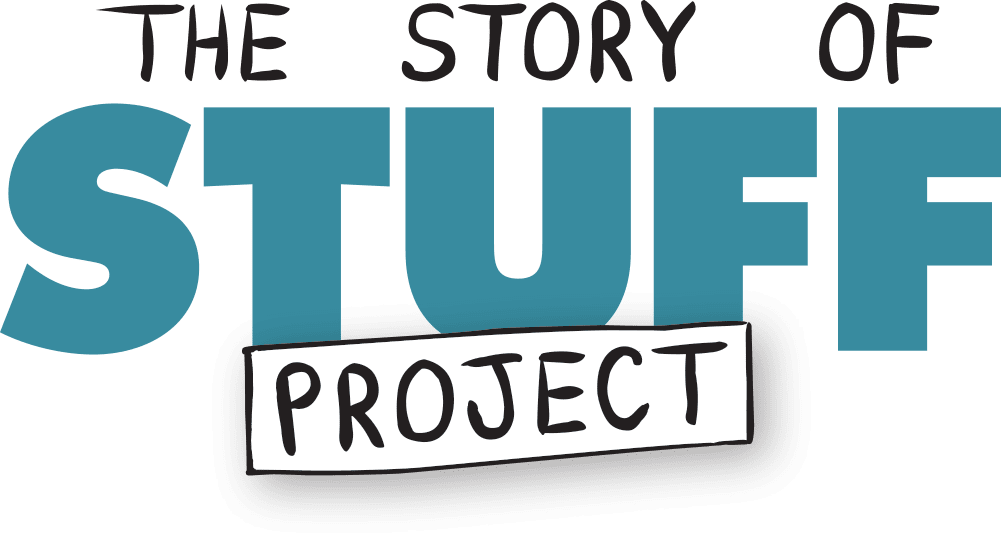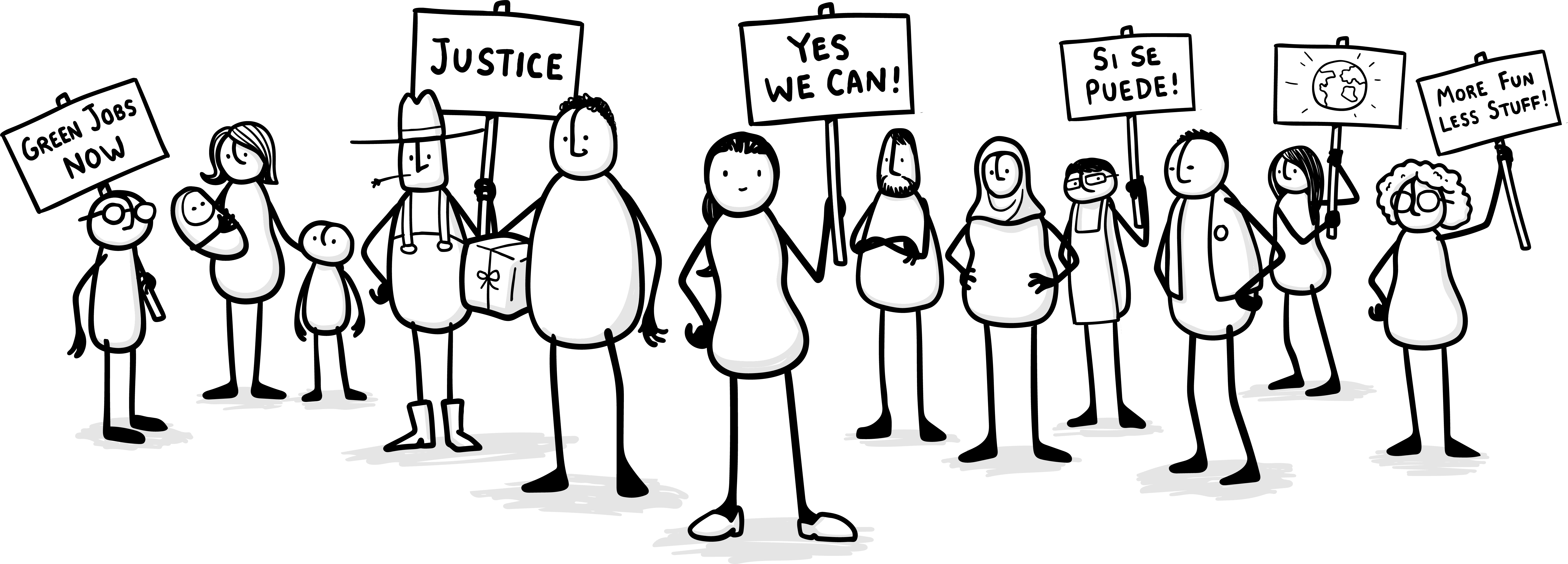Summer has begun, and so have the heat waves. Did you know that the cool beverage bottle you reach for when it gets too hot is a major contributor to climate change? We’re not talking about the product – we’re talking about the packaging.
The beverage industry sells more than 580 billion PET plastic bottles per year – nearly 1 million a minute! – and the PET plastic supply chain emits nearly 9 million metric tons of greenhouse gasses every year, in North America alone. But, this single-use bottle is among the easiest plastic problems we can solve, if we can just replace it with a reusable container. Reuse can reduce up to 40% of raw material inputs and 50% of greenhouse gas emissions associated with beverage packaging.
As you probably know, we at The Story of Stuff have been working towards this goal with our Bring Back Refill campaign. So far, we’ve achieved a level of momentum and enthusiasm for refillable targets that has exceeded even our own expectations! Keep reading for more on campaign updates, our work in reuse for foodware, and much more.
Legislative Update on Bring Back Refill
We’re working on winning mandatory refill quotas for beverage containers as part of state policy. Here’s a state-by-state update:
California: Story of Stuff sponsored a bill (AB2762) that would call for quotas of 25% in ten years, 10% in eight years and 5% in six years. While it didn’t pass this year, we’re pushing hard for 2025 by working with a lobbyist, identifying additional sponsors, and holding a briefing this summer for Assemblymembers to continue the education of legislators ahead of next year.
Massachusetts: Both the House and Senate will be releasing a Climate Omnibus Bill. The Senate version includes a bottle bill. While we initially advocated for inclusion of reuse quotas, leadership was clear that this would not be included in the Climate bills. We were successful in getting the requirement of a reuse feasibility study into the House bill. A vote is imminent in the House. Once the climate bills are enacted in each house the bills are considered by a conference committee that hammers out the final bill. There is no vote after that.
New York: The Bigger, Better Bottle Bill proposal included our refill targets as well, gaining enthusiastic support from partners like Beyond Plastics and NYPIRG; with two major plastics reductions bills on the legislature’s slate, including a model EPR packaging bill with some momentum, it appears the bottle bill will fail to move before the legislative deadline. We will prepare for a renewed push on bottle bill modernization with reuse in 2025.
Washington, North Carolina and Rhode Island: These states have no existing deposit return system, however bills with refill targets were nonetheless introduced. The Washington and Rhode Island bills did not survive this legislative session. The North Carolina bill is still in play but unlikely to pass this year. This signals an expanding interest in refill and deposit systems that we will jump on in 2025.
Maryland and Washington, DC: In these jurisdictions, advocates developed bills with reuse language in them. Maryland’s didn’t move forward this year and D.C. advocates are waiting for budget negotiations to end before introducing its draft bill. Both are poised to move ahead next year.
In addition, we are currently in discussion with the legislative champion of reuse in Oregon, Senator Sollman, about drafting a standalone reuse targets bill for the beverage industry next session.
Annie Returns to the Small Screen
We’re excited to have our founder and host of the original Story Of… films, Annie Leonard back in the second installment of our EXPOSED series. In this video, we continue to hold Coca-Cola – a giant of the beverage industry and the top plastic bottle polluter in the world – to account by exposing one of the company’s favorite greenwashing tactics. Watch the video.
More broadly, we’ve used our extensive communications capabilities to frame and elevate refill as a solution to beverage container waste and plastic pollution, from developing social media campaigns to distributing thousands of postcards to legislators.
Community Engagement at an All Time High!
We’ve been flexing our Changemaking muscles like never before in support of Bring Back Refill’s legislative efforts, driving more than 2,000 direct legislator contacts by members of our Community, including via handwritten postcard, email, phone, webform and in-person.
In addition, we’re holding policy workshops to equip folks – both grassroots activists and those involved in passing legislation – with the information they need to press for legislative quotas. After our successful webinar in February for 60 such advocates, we followed up with grassroots trainings in Massachusetts and California. Additional workshops are in development for legislators, staff and other stakeholders in Rhode Island, Oregon, Maryland and Washington, DC.
Reuse in Foodware
With the addition of national reuse expert Miriam Gordon to our full-time staff, we’ve been able to expand our advocacy for widespread reuse policies not just for the beverage industry, but for onsite dining as well. This is an initiative that works from the ground up, starting at the local level and moving up regionally. So far, our team has led local reuse coalitions in San Francisco and Oakland, and participates in others in NYC and Los Angeles. Reusable Oakland recently succeeded in getting a local reuse ordinance enacted in Oakland and decided to expand its work to all of Alameda County where Miriam is leading policy campaigns for San Leandro, Livermore and Pleasanton. As the leader of Reusable San Francisco, Miriam is also leading efforts to enact a reusable foodware policy in the City of San Francisco.
The Reuse Project tracks and supports local reusable foodware policy efforts across North America and is currently supporting policy efforts in Denver, Boulder, Los Altos, Sunnyvale and Albany. The plan is to bring reuse in foodservice to up to 20 cities across the U.S. over the next couple of years.
This project will also develop a boot camp for local reuse activists to train and increase the number of local activists engaged in enacting policies locally and supporting state-level reusable foodware and beverage policies. Next up, we’re researching and preparing a report on a major fast food corporation’s role in disposability.
The Fight Against BlueTriton Continues
Though BlueTriton has sued to challenge last year’s Cease & Desist Order, which was meant to stop the removal of tens of millions of gallons of water from the San Bernardino National Forest, the fight continues. The case is winding its way through court and in the meantime, we’ve filed a renewed complaint with the CA Department of Fish & Wildlife. And through our Grassroots Grants program, we’re supporting our longtime partner on the ground, the Save Our Forest Association, as they apply pressure on the Forest Service – one of the few agencies that can force BlueTriton to end its occupation of federal lands. Read more: “Environmentalists urge California wildlife officials to investigate bottled water operation”
Additionally, our Grassroots Grants program will award a total of $40,000 in direct grants over the summer to frontline groups engaged in water and plastics fights.
New Staff Member!
We’re excited to grow our team with the addition of Anna Sorokina as our new Marketing and Communications Manager! This is a position we’ve been trying to fill for a while, and we’re confident that a dedicated staffer to shepherd our content and grow our audience will have only the best outcomes for our campaigns, storytelling, and beyond.





